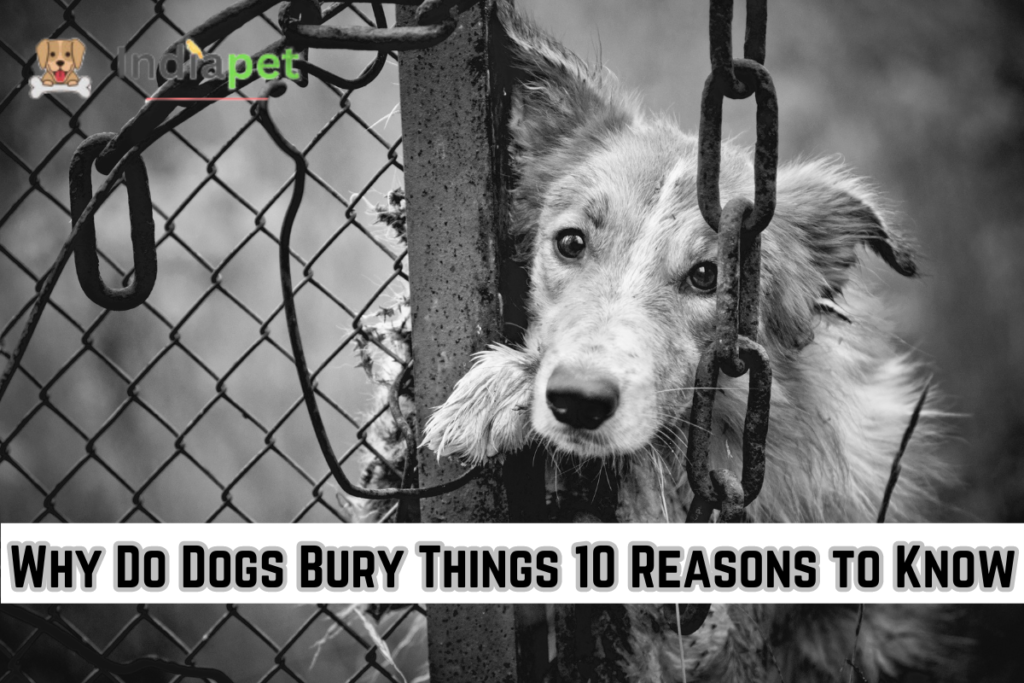Are your dog’s favorite bones and toys slowly disappearing? Discover Why Do Dogs Bury Things:- 10+ Reasons, and how or if you should stop it.
Why Do Dogs Bury Things

1. Instinctual Behavior:
This behavior’s root lies in a deeply embedded instinct inherited from their wild ancestors. Wolves, the ancestors of domestic dogs, bury excess food to hide it from scavengers and preserve it for later consumption.
Although our beloved pets no longer need to hunt to survive, this instinct persists, manifesting as burying toys, bones, and sometimes food.

2. Preservation and Protection:
One of the main reasons dogs bury things is to preserve and protect their prized possessions. By burying items underground or hiding them in secluded locations.
Dogs create a safe haven where their treasures are protected from potential threats. This behavior reflects their innate desire to protect valuable resources from competitors and predators.

3. Scent Marking:
Dogs have a strong sense of smell and use scent markings to communicate with other animals in their environment. Burying objects allows dogs to leave their scent behind, effectively marking their territory and asserting their presence.
This behavior serves as a social signal, conveying important information to other dogs who may encounter the buried objects.

4. Stress Relief:
Dogs experience stress and anxiety, and burying objects can serve as a coping mechanism in times of emotional distress. Engaging in repetitive, ritualistic behaviors such as digging and burying helps dogs reduce stress and provide a sense of comfort and security. It is similar to a therapeutic outlet that allows them to channel their pent-up energy and emotions.

5. Natural Foraging Instincts:
Foraging is a basic survival skill for wild dogs. Even though modern dogs are fed regularly by their owners, their innate instinct to forage for food remains.
Burying objects mimics the behavior of foraging for prey, fulfilling their innate need to hunt and gather. This primitive instinct is deeply ingrained in their genetic makeup and continues to manifest in a domestic setting.

6. Hide and Seek:
For some dogs, burying objects is simply a fun and engaging game. Like fetching or chasing a ball, burying objects provides mental stimulation and entertainment.
Dogs love the thrill of hiding their toys and then finding them later, using their natural curiosity and problem-solving skills. This playful aspect of burying behavior strengthens the bond between dogs and their owners through interactive play.

7. Hoarding Behavior:
Some dogs display hoarding tendencies, collecting and depositing various items in hidden locations. This behavior stems from the survival instinct to ensure a constant supply of resources in times of scarcity.
Dogs may bury toys, bones, or even household items as part of their hoarding behavior, driven by an innate desire to collect and safeguard their possessions.

8. Temperature Regulation:
Do dogs bury things? Believe it or not, burying objects can also serve a practical purpose related to temperature control. In warm climates, burying objects underground provides a cool and shady refuge from the scorching sun.
Similarly, in colder regions, burying objects can help insulate them from the cold, keeping them warm during cold weather. Dogs instinctively seek out comfortable environments to rest and relax; burying objects is a way to adapt to their surroundings.

9. Natural Instincts:
The desire to bury things is deeply rooted in dogs’ instincts and behavior. Whether motivated by a need to preserve resources, mark territory, reduce stress, or have fun.
Burying objects is a complex and multifaceted behavior that reflects dogs’ rich evolutionary history. Understanding the underlying reasons behind this behavior can help dog owners better connect with their pets and meet their physical and emotional needs.

10. Ancestral Remnants and Genetic Influences:
Dogs’ burrowing behavior can also be traced to their ancestral roots and genetic influences. Despite being domesticated for centuries, dogs still possess many traits inherited from their wild ancestors, including instinctive grooming.
Understanding the evolutionary history of dogs and the selective pressures that shaped their behavior provides valuable insight into why dogs display this age-old behavior even in modern times.

Conclusion:
In conclusion, “Why do dogs bury things?” involves a variety of motivations and instincts, each of which contributes to this fascinating behavior. From preserving resources to marking territory and providing mental stimulation, burying objects serves various purposes for our canine companions.
Why Do Dogs Bury Things? 10 Reasons to Know By recognizing and appreciating the underlying reasons behind this behavior, dog owners can gain valuable insight into their pet’s instincts and behavior, promoting a deeper understanding and stronger bond between humans and dogs.
So, the next time you see your furry friend digging in the backyard, remember there’s more to it than meets the eye – it’s all part of being a dog.

